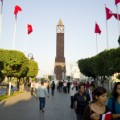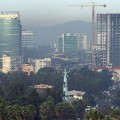Economic potential of African urban centers
1. Cairo, Egypt – A 2015 report by PwC ranked 20 African "Cities of Opportunity," looking at a number of factors, including infrastructure, human capital, economics and society and demographics. The Egyptian capital of Cairo topped the list thanks to its large scale, middle class and international clout, although analysts observed current political turmoil as a potential sticking point for investors.
Economic potential of African urban centers
2. Tunis, Tunisia – North African cities dominated the top five, with Tunis coming second. Analysts cited the city's top ranking health system and number of graduate enrollments, with Tunis trumping the rest of African urban centers in terms of human capital.
Economic potential of African urban centers
3. Johannesburg, South Africa – An anomaly among the top five, Johannesburg is both south of the Sahara and, having been founded in only 1886, is a relative newcomer. The South African city performed strongly in all main categories with the exception of society and demographics, where high crime, stagnating middle-class and overall population growth hindered the city.
Economic potential of African urban centers
4. Casablanca, Morocco – Casablanca triumphed in the hotly-contested economics index, coming first in GDP diversity and as a key location for Top 500 company headquarters -- top transport and energy infrastructure rankings no doubt helped in this sense. However, and like Tunis, the city was let down by poor diversity and population growth, typical of the North African cities surveyed.
Economic potential of African urban centers
5. Algiers, Algeria – Algiers was a high achiever in terms of human capital, with the second highest rate of graduates and an excellent health system. Its mid-table position in economics hindered its progress up the table, and while its middle-class numbers stagnate, crime levels were one of the lowest in Africa.
Economic potential of African urban centers
6. Accra, Ghana – Accra was commended for its ease of doing business and GDP diversity. Poor rankings in healthcare and infrastructure let the city down, but with a stable political environment and a high ranking in terms of attracting foreign direct investment, analysts expect Accra to climb the rankings in the future.
Economic potential of African urban centers
7. Nairobi, Kenya – Nairobi came second only to Cairo when it came to international clout. The Kenyan capital was the top attraction for foreign direct investment and has a strong financial services industry, but shortcomings in infrastructure, healthcare and further education demonstrated room for improvement.
Economic potential of African urban centers
8. Lagos, Nigeria – High housing and business occupancy costs hindered Lagos, bringing down its infrastructure score. This is perhaps a result of its strong financial industry, with the Nigerian mega-city attracting substantial amounts of foreign investment and providing the headquarters for many Top 500 companies.
Economic potential of African urban centers
9. Addis Ababa, Ethiopia – Addis Ababa is experiencing a middle class explosion and boasts high diversity, while it topped the rankings in city scale. However, it had the worse GDP per capita and literacy rate of the cities assessed, while foreign investment is still in its infancy. But, ranking third overall in terms of infrastructure, analysts expect the investing situation -- and its ranking -- to improve.
Economic potential of African urban centers
10. Kampala, Uganda – Kampala founds its way into the top 10 off the back of one category: society and demographics. It had the highest ranked population growth, strong diversity and international clout -- fertile ground for a prosperous future workforce. GDP is growing at a steady rate and literacy rates are near the top. Limited infrastructure could be a barrier to future success.





























